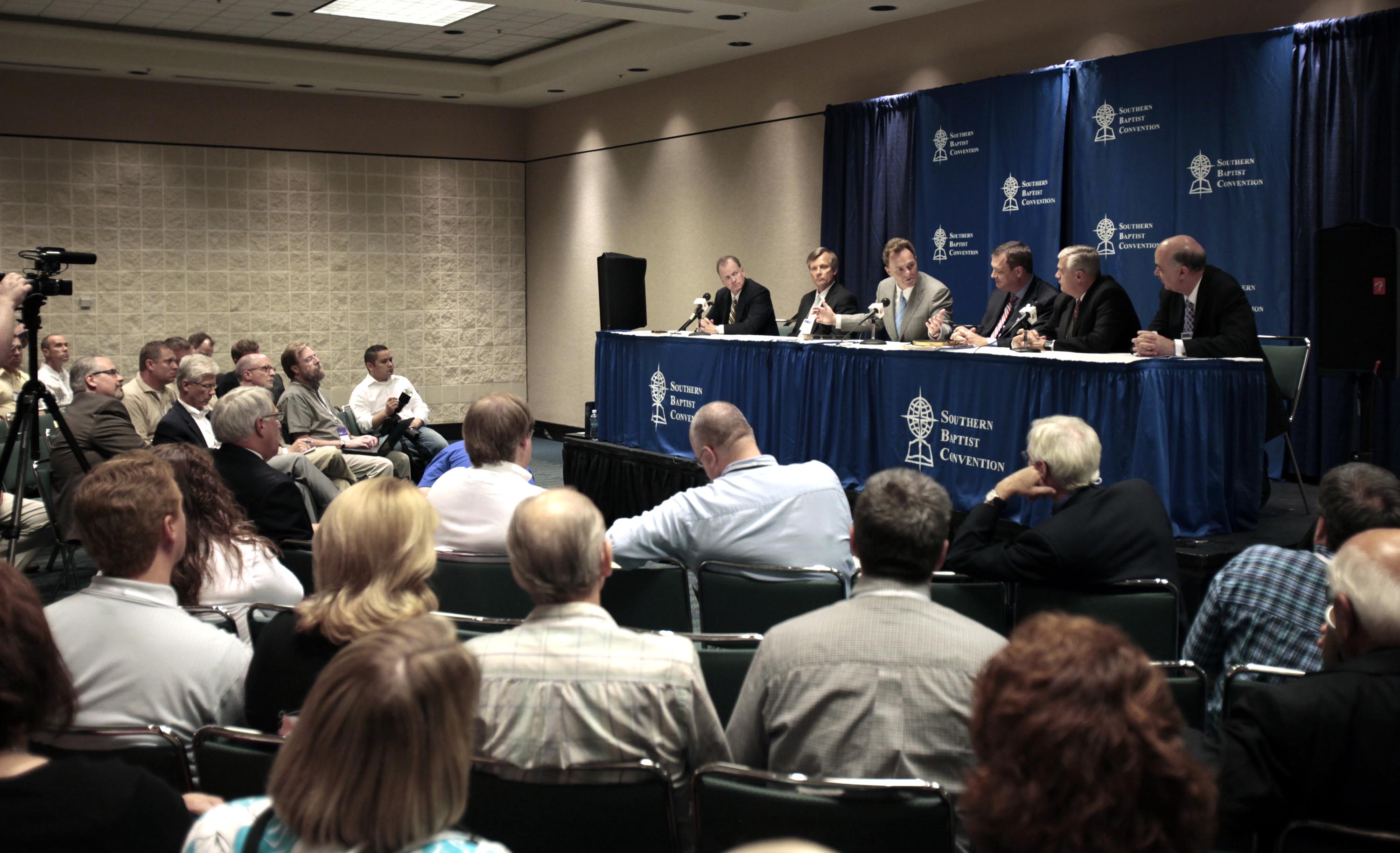
ORLANDO, Fla. (BP)–Amendments to the Great Commission Resurgence Task Force’s final report strengthened one of its recommendations and caused it to better reflect the priorities of Southern Baptists, task force members said at a news conference June 15.
“The bottom line is that in an inelegant way we have a superior recommendation,” task force member R. Albert Mohler Jr. said of the amendment process. “I think it’s, in one sense, Southern Baptists at their very best — sometimes a bit clumsy but determined to get to the same place together. And I appreciated the spirit of the messengers.”
The two amendments Mohler referenced state that Southern Baptists “continue to honor and affirm the Cooperative Program as the most effective means of mobilizing our churches and extending our outreach” and that “We affirm that designated giving to special causes is to be given as a supplement to the Cooperative Program and not as a substitute for Cooperative Program giving.”
According to Mohler, president of Southern Baptist Theological Seminary in Louisville, Ky., debate on the amendments did not reflect any serious division in the convention.
“I especially appreciated the intent and tenacity of Dr. John Waters [who proposed the amendments] to come and actually get to our attention what further he wanted to say,” Mohler said. “Everything he wanted said this task force unanimously wanted to say. In one sense, if we had received that word prior to the formulation of the final report, I can basically assure you it would have been in there because we resonated with that language.”
Task force chairman Ronnie Floyd agreed that the entire discussion reflected a spirit of unity and love, estimating that between 75 and 80 percent of messengers supported the final report. Other observers estimated the final vote at closer to 60 percent.
“We just thank all of Southern Baptists for believing in the Great Commission,” Floyd said. “And now we move forward.”
As members of the Executive Committee and trustees of SBC entities consider how to implement the recommendations, Mohler said he expects them to defer to the will of the messengers and not resist the task force’s vision.
“Now the boards of trustees will consider this,” Mohler said. “The convention has spoken overwhelmingly, and now it is the incumbent duty of various boards to respond to the convention’s action while doing their implementation in the way they are assigned.”
Because the recommendations already took into account input from the entities, any opposition from boards would be unexpected, Mohler said.
“Our sincere hope was that this moves in a direction that would encourage them to do what they may have been looking for some encouragement to do,” he said. “So I really don’t foresee any entities turning back to the convention and saying, ‘These things are basically bad, erroneous ideas.'”
However, Roger Spradlin, a task force member and newly elected chairman of the Executive Committee, said the full EC did not have input into the GCRTF deliberations. He acknowledged that implementing recommendation seven would result in deep budget cuts at the EC but said transferring a nearly a third of the EC’s budget to the International Mission Board would make an eternal impact for Christ.
“It represents roughly 46 missionaries,” he said of the funds the GCRTF wants transferred from the EC: “46 different people groups — some primitive tribe in the Amazon or somewhere in the world, one of these people groups that have not heard the Gospel, that not a single one of their ancestors had heard the name of Jesus. Not one of their descendants will hear the name of Jesus for maybe another generation or two unless a missionary goes to that people group. Then you multiply that times 46 different missionaries sent around the world, and all of a sudden it becomes very significant.”
Floyd said he does not expect lingering hard feelings regarding the recommendations and expressed appreciation for EC President Morris H. Chapman, who publicly opposed parts of the task force’s report.
“Dr. Chapman is a great Baptist,” Floyd said. “Baptists have spoken. Baptists get their lives in line and their hearts and their opinions. And I believe Dr. Chapman will do that. We love Morris. We thank God for the time that he has given to the Executive Committee.”
In a matter slated for debate June 16, the task force expressed its opposition to a motion requesting that recordings of the task force’s deliberations be opened immediately rather than remaining sealed 15 years, as the GCRTF previously decided. Making the recordings public right away would discourage future Southern Baptist committees from keeping any audio records of their meetings for fear of similar immediate unsealing, Mohler said.
“The issues being discussed are so close,” he said. “I think if the motion on this were to pass, there simply will be no more recordings made, which would rob us of the historical memory that could one day be available because that simply would shut down any ability to have a deliberation totally honest and open.”
Reflecting on the convention’s vote, task force member Daniel Akin said it is only the first step toward a denominational commitment to reach the nations for Christ.
“We need to be looking forward with an aggressive agenda, as the report says, to penetrate the lostness around the world and in North America,” said Akin, president of Southeastern Baptist Theological Seminary in Wake Forest, N.C. “I pray with all of my heart that Southern Baptists will indeed experience revival and resurgence.”
–30–
David Roach is a writer and pastor in Shelbyville, Ky.

















